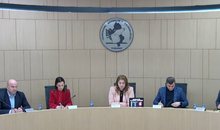
 Flash News
Flash News
Thousands of cannabis roots found and destroyed in Shkodra, 4 prosecuted
Election effect, employment in the state reaches record in the first quarter
NAME/ The assets of the businessman in Gjirokastra are seized! How Berisha denounced him in 2019
Hostage taking in Tirana, 40-year-old man forcibly taken into car
Car catches fire in Tirana
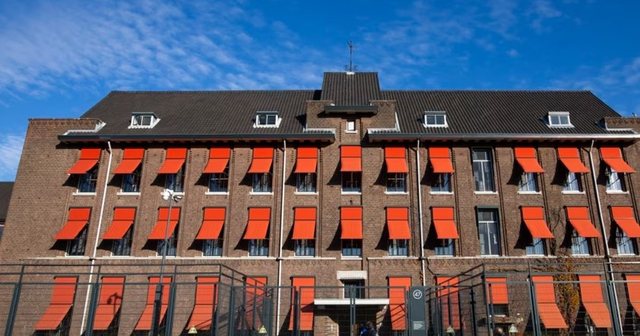
The U.S. contribution to the Specialist Chambers in The Hague is primarily focused on funding for employees appointed by state authorities. That's what court spokeswoman Angela Griep told RFE/RL when asked if the institution's funding would be affected after the temporary suspension of U.S. funding.
Griep did not provide information on whether the court's staff, who comes from the United States, is affected by the ruling or not.
U.S. President Donald Trump has frozen international aid for 90 days. The freezing of aid funding is part of the U.S. president's effort to adapt those programs to his foreign policy goals.
But there is no confirmation whether the suspension affects both the Specialist Chambers and the Kosovo Specialist Prosecutor's Office, based in The Hague, Netherlands.
These institutions, also known as the Special Court, investigate alleged crimes committed by members of the Kosovo Liberation Army committed against ethnic minorities and political rivals from January 1998 to December 2000.
Currently, several trials are being conducted in The Hague against former KLA leaders and the court has also issued several condemnatory decisions.
Who is funding the special court?
The special court is funded by the European Union, but also by the third contributing countries, including the United States, Canada, Norway, Switzerland and Turkey.
The Specialist Chambers and Prosecutor's Office currently has a budget of 97.1 million euros, spanning the period from June 15, 2023 to June 14, 2025.
The entire budget is funded by the EU, but other countries also contribute to certain programs.
In this context, the U.S. mainly contributes to funding for some employees, Griep says.
According to the Court's latest annual report, which is out in 2023, the UNITED STATES ranks second, behind the Netherlands – the court's host state – in terms of the number of employees in the Specialist Chambers and Specialist Prosecutor's Office.
Employees appointed by the U.S. to various posts, offer their expertise to the Special Court.
The Specialist Chambers and Prosecutor's Office employ two categories of workers: employees appointed through the state authority (seconded) and contracted employees. But, the Special also contributes to practitioners from EU and other contributing countries.
The U.S. funds its workers who are appointed through state authorities.
At the Special Court, these employees assigned to work in The Hague remain employed in institutions in the United States, mainly in governments, international organizations or law enforcement agencies.
These employees generally, but also depending on the procedures of states for the appointment of personnel, shall serve on the Special Court for at least one year, with the possibility of extension of service.
Their expenses, including salaries, health insurance contributions, travel expenses and other compensations are covered by the state that appointed them.
They are also paid, depending on circumstances, to pay for the perdition.
Among the U.S. employees are specialised judges and prosecutors. The court's vice president is Charles L. Smith III, and the chief prosecutor, Kimberly West, took over the post in 2023.
Judge Smith is also the lead judge in the largest case in the court, the one against former KLA leaders: former Kosovo President Hashim Thaci, former parliament speakers Jakup Krasniqi and Kadri Veseli and former DEPUTY Rexhep Selimi.
According to the data, as of December 31, 2023, 283 persons were employed at the Special Court, out of 30 from the United States. The number of employees appointed by state authorities also increased in 2023, and three of those were from the U.S. and Switzerland.
The funders of the Special Court cover the operating costs of this institution, but also fund certain programs and aspects of the operation. For example, Norway has financed the renovation of the Court building and Switzerland, through a grant, has contributed to the funding of the information program since 2018.
Latest news


Thousands of cannabis roots found and destroyed in Shkodra, 4 prosecuted
2025-06-26 09:10:50

Costly experiment: Italy weighs costs of migrant centers in Albania
2025-06-26 08:54:01
Election effect, employment in the state reaches record in the first quarter
2025-06-26 08:40:21
Parliament in plenary session, draft laws expected to be approved
2025-06-26 08:29:34
Horoscope, what do the stars have in store for you today?
2025-06-26 08:12:59
Parashikimi i motit, temperaturat arrijnë deri në 37 gradë
2025-06-26 07:58:10
Posta e mëngjesit/ Me 2 rreshta: Çfarë pati rëndësi dje në Shqipëri
2025-06-26 07:45:04
CIA chief: Iran's nuclear facilities 'severely damaged' by recent attacks.
2025-06-25 22:53:09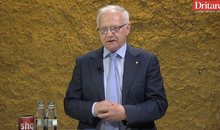
NATO spending to increase by 5%, diplomat: Aims to pull economies out of crisis
2025-06-25 22:32:28

Djegia nga dielli, ja disa mënyra si ta trajotni në kushte shtëpie
2025-06-25 21:56:19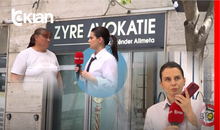

Rama: NATO Summit in 2027 will be held in Tirana
2025-06-25 21:36:35
What is known about the weapons that Serbia has banned from exporting to Israel?
2025-06-25 21:23:19
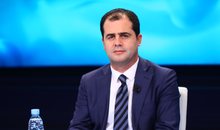
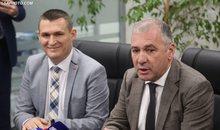
The new war front? Not in the Middle East, but in SPAK!
2025-06-25 20:40:02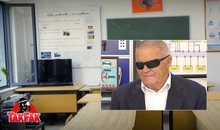

Gjendet e vdekur 56-vjeçarja shqiptare në Greqi! Nënë e 3 fëmijëve
2025-06-25 20:21:03
PHOTO/ Car falls off bridge on Peqin-Elbasan axis
2025-06-25 20:11:16

Trump at NATO summit: In recent weeks we have dealt with Kosovo and Serbia
2025-06-25 19:47:10


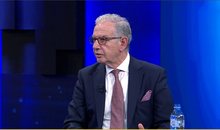


Trump: US to meet with Iran next week, but nuclear deal not necessary
2025-06-25 18:15:22




NATO's defense plan, what will change for Albania?
2025-06-25 16:42:07
Bayern loans Albanian talent to German team
2025-06-25 16:32:00

Kremlin: US and Iran disagree on damage caused by attacks
2025-06-25 16:13:55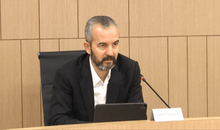
11 maji/ KQZ vulos rezultatin, u jep mandatin deputetëve për 4 qarqe të vendit
2025-06-25 16:00:32
Iran: Nuclear facilities suffered severe damage from US airstrike
2025-06-25 15:49:38
Hostage taking in Tirana, 40-year-old man forcibly taken into car
2025-06-25 15:35:51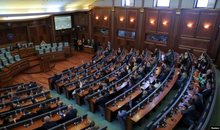
Kosovo/ The constitution of the Assembly fails for the 37th time
2025-06-25 15:24:28
Car catches fire in Tirana
2025-06-25 15:06:53
5 super healthy foods you should add to your diet
2025-06-25 14:57:48
TikTok returns to Albania, one-year ban quietly lifted after three months
2025-06-25 14:49:14


Gunfight at the Institute, 7 people involved, one of them arrested
2025-06-25 14:21:10
Convict dies in Lezha prison
2025-06-25 14:08:16

ACE Closes Filma24, the Movie Piracy Giant in Albania
2025-06-25 13:44:37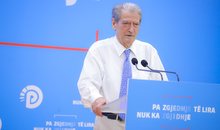

SPAK postpones the investigation against Ahmetaj for the fourth time
2025-06-25 13:12:42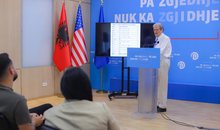

Communication services in Albania cost more than the EU average
2025-06-25 12:55:50
How to choose the right perfume scent according to your personality
2025-06-25 12:44:36




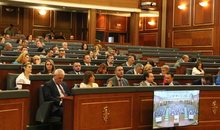
Today is the 37th attempt to constitute the Assembly.
2025-06-25 11:34:23
Accident in Tirana, taxi hits two children with a wheelchair
2025-06-25 11:19:05
Some reasons why gossip isn't as toxic as you think
2025-06-25 11:07:51

Selling dope in nightclubs, 33-year-old arrested in Tirana
2025-06-25 10:45:25
The Supreme Court rejects the appeal of Jamarbër Malltez
2025-06-25 10:26:58
The warned cyberattack on Tirana Municipality brings back security concerns
2025-06-25 10:19:43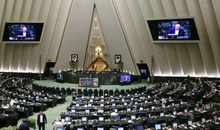
Iranian parliament votes to suspend cooperation with UN nuclear watchdog
2025-06-25 10:03:02
Bosnian fraudster arrested, wanted in Germany
2025-06-25 09:53:10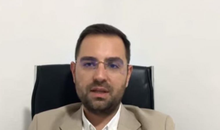
May 11/ Nuri: The vote 'died' before it was cast in the box
2025-06-25 09:42:02
Men with big bellies are at risk of suffering from this problem
2025-06-25 09:37:26

Today, around 28,000 9th grade students are taking the math exam.
2025-06-25 09:19:14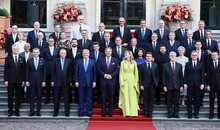
NATO arms itself against potential threats from Russia
2025-06-25 09:03:09
Tourists don't come, Albanians leave!
2025-06-25 08:59:08
TNT explosion in Vlora
2025-06-25 08:38:41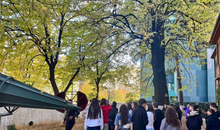
Tourism/ Kosovo "flees" after visa waiver, Poles and Spaniards "get upset"
2025-06-25 08:22:43
Horoscope, what do the stars have in store for you today?
2025-06-25 08:09:54
Ditë me diell, parashikimi i motit, si do të ndryshojnë temperaturat
2025-06-25 07:59:33
Morning Post/ In 2 lines: What mattered yesterday in Albania
2025-06-25 07:45:27

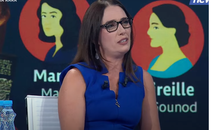

Earthquake tremors felt again in Tirana
2025-06-24 22:11:53


US intelligence: Attacks on Iran did not destroy nuclear plants
2025-06-24 21:30:31
Accident on the Fier-Cekan axis, 3 injured
2025-06-24 21:16:32



Cancer season, what is expected to happen for each zodiac sign
2025-06-24 20:15:54


After ceasefire, Iranian airspace partially reopens to international flights
2025-06-24 19:47:10
Oil prices fall after Israel-Iran ceasefire reached
2025-06-24 19:26:52
